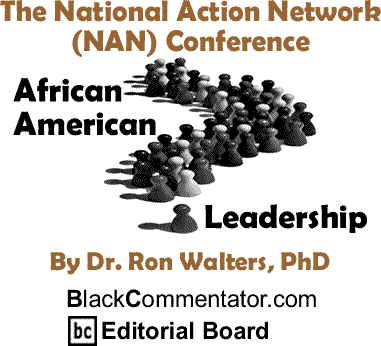
|
||||||||||||||||||||||
|
||
 |
||
| Rev. Al Sharpton, head of NAN, should be congratulated for pulling off a remarkable conference that contained a nationally televised Symposium of African American leaders. The main highlights of the discussion, moderated by Roland Martin of MSNBC and Radio One, were political and economic empowerment and the development of the Black family. The main point was to have a discussion on the salient issues and then for each organizational leader to commit themselves to achieving a specific goal within a given period of time. I will comment on each of the main highlights. I think that the primary point with respect to Political empowerment was made by Rev. Sharpton who made a commitment for NAN to go into five key states and increase the vote by 5% for the fall election. This is critical and coincides with a recent proposal made by Ron Daniels, head of the State of the Black World 21st Century, to mount a bus tour through the country with those who are known to be able to turnout voters such as Rev. Jesse Jackson, other key civil rights leaders, politicians and ministers, stopping at key venues to mobilize voters. The united action of Sharpton and Jackson would be dynamite. The reason for this increasing political mobilization was articulated by Martin who said that after the election of President Barack Obama, his supporters lost momentum. Rep. James Clyburn agreed with this, adding that we have regained some with the passage of the Health Care Act and will gain more with the passage of Financial Reform. However, we need to mobilize before this November and I like the proposal of creating a �Cocoa Party� similar to my call for a Black Party to provide a vehicle in local communities to confront the Tea Party, expose their racist madness and mount a campaign of civic engagement to target the economic resources into our communities. The discussion on Economic empowerment was equally pointed with proposals ranging from acquiring more financial literacy to placing our resources in community and African American financial institutions. But the paradigm for our development is clear � if we did it, we could fund our own �stimulus packages� for development, provide proper mortgages for people they could afford, and seed neighborhood employment projects. I have heard that for many years, but something must be done about the lack of trust that prevents it. The discussion on financial literacy I have also heard before, but in light of the financial meltdown that took the resources of so many Black people with it, we should become more knowledgeable about how we interface with the Capitalist system. In most cases, we have naive notion of what is going, and the fine points of how we are being bilked out of billions of dollars by people who could care less about our welfare means that we must become more expert � or seek out expertise � on exactly how to protect ourselves and advance our economic interests.
Tens
of thousands of Blacks were persuaded to place their money into
mortgages that were worthless. Meanwhile, read the book, 13
Bankers: The Wall Street Takeover and the Next Financial Meltdown The discussion about the Black family was equally important and Jeff Johnson of BET, 100 Black men and others talked about the importance of mentoring and job counseling for youth; others said this was crucial because we have been losing Black youngsters start dropping out beginning at the 7th grade. For my money, there was an awareness of the issues, but not enough discussion about the interaction among factors such as: the state of the Black family, the lack of jobs, the push toward drug trade and other illegal activities, and the prison industrial complex. So, I want to argue again that many of the felony prohibitions written into the 1994 Crime Control Act need to be repealed.
BlackCommentator.com Editorial Board member, Dr. Ron Walters, PhD is a Political Analyst, Author and Professor Emeritus of the University of Maryland, College Park. His latest book is: The Price of Racial Reconciliation (The Politics of Race and Ethnicity) (University of Michigan Press). Click here to contact Dr. Walters. |
||
If you would like to comment on this article, please do so below. There is a 400 character limit. You do not need a FaceBook account. Your comment will be posted here on BC instantly. Thanks. Entering your email address is not mandatory. You may also choose to enter only your first name and your location.
|
||
Thank you very much for your readership. |
||
| Any BlackCommentator.com article may be re-printed so long as it is re-printed in its entirety and full credit given to the author and www.BlackCommentator.com. If the re-print is on the Internet we additionally request a link back to the original piece on our Website. | ||
| |
||
April 29, 2010 |
| Executive Editor: David A. Love, JD |
| Managing Editor: Nancy Littlefield |
| Publisher: Peter Gamble |
| Est. April 5, 2002 |
| Printer Friendly Version in resizeable plain text format |
 |
 |
 |

|
 |
| |
| |














































